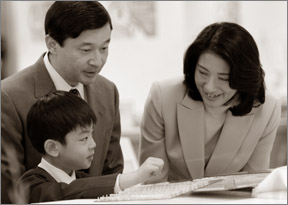The Empire Strikes Back
Japan's Imperial Household, an institution usually notable for its
icy reserve, has launched a furious attack on the Australian author of a
book about Emperor Akihito and his family, denouncing it as
irresponsible, distorted, coarse, audacious and contemptuous of the
world's oldest hereditary monarchy.
|

Japanese Crown Princess Masako (R) talks to 2nd grader Ryoma Noda as
Ryoma shows his invention, Clear Box for Shogi (Japanese Chess) Set,
to Crown Prince Naruhito (L) and the princess at the Exhibition of
the 65th Concours of Schoolchildren's Inventions in Tokyo 07 March
2007. Ryoma's invention won the Prime Minister Prize. -AFP
|
In an unprecedented reaction to a book published overseas, both the
Japanese ambassador to Canberra and the Grand Chamberlain to Emperor
Akihito have written to its author, Ben Hills, and his publisher, Random
House Australia. Speaking on behalf of the Japanese government, the
ambassador, Hideaki Ueda, demands an apology for the book, 'Princess
Masako: Prisoner of the Chrysanthemum Throne'.
"The book . . . contains irresponsible citations of rumours, press
reports, comments of self-proclaimed insiders and other sources, which
comprise unfounded and highly contemptuous descriptions of the
appearances, activities and speeches of Their Majesties," he writes.
"[It also contains] disrespectful descriptions, distortions of facts,
and judgmental assertions with audacious conjectures and coarse logic,
pertaining to the birth of Her Imperial Highness Princess Aiko and the
physical conditions of Her Imperial Highness the Crown Princess
[Masako]."
The book is a biography of the former Masako Owada, who abandoned a
promising career as a diplomat in Japan's foreign ministry, to marry
Crown Prince Naruhito in 1993. At the time she was compared to Princess
Diana, and many people hoped that she would bring change to the Imperial
Household Agency, the deeply conservative government ministry which runs
the lives of Akihito and his immediate family.
The opposite happened. As The Times was the fist to reveal in 2004,
Masako has been treated for depression after suffering a nervous
breakdown the year before. Few verifiable details of her illness are
known outside the inner circle of courtiers and doctors.
But it seems likely that her condition has been worsened by the
isolation in which she lives within her official residence, the Togu
Detached Palace, and the intense pressure on her to produce a male heir.
After a miscarriage - and, according to palace observers, a course of
fertility treatment - she gave birth to a daughter, Princess Aiko, at
the age of 38 in 2001.
The Chrysanthemum Throne was facing a succession crisis until the
Emperor's younger son, Prince Akishino, had a baby boy last year -
Prince Hisahito, the first son born into the family in 40 years.
Few Japanese journalists, and no foreigners, have direct access to
members of the Imperial Family; even the officials of the Imperial
Household Agency, are notoriously secretive, excluding foreign
journalists from briefings which are open only to a tame "reporters'
club". Privately, its members admit that they would be expelled from the
club if they wrote anything embarrassing to the Imperial Household
Agency.
The further threat of violence from right wing ultra-nationalists
ensures that nothing remotely critical ever makes in into mainstream
press. As result, Mr Hills book, like all investigative journalism on
the subject, relies to a large extent on unnamed or unidentified
sources.
It is an unrelentingly negative account of the Imperial institution,
which is portrayed as an absurdly anachronistic, sexist and bloodless
institution, which elevates ritual, superstition and hierarchy over the
happiness of the members of the family.
The marriage of Naruhito and Masako, he writes, is "a romance gone
wrong, a young couple crushed by forces over which they have no control,
a marriage which neither will survive undamaged, but from which neither
seems capable of escaping".
The book contains no significant new revelations, but tells the story
of the couple's courtship, wedding and the difficulties of their
marriage, including Masako's depression.
It also recounts, as wild rumours, stories about the conception of
Aiko, including speculation that the Crown Prince is infertile, and the
child was conceived from the seed of his father or younger brother.
Ambassador Ueda gives no examples in his letter but it seems to be
these "coarse", and wholly unsupported tales, that seem to have most
upset the Imperial Household Agency.
The letter from Grand Chamberlain, Makoto Watanabe, rejects Mr Hills'
contention that the public appearances of the Emperor and Empress are
meaningless formalities, with a lengthy account of their work with the
physically and mentally handicapped and with lepers.
"I completely reject their attempt to intimidate me and I completely
reject that there is anything inaccurate or any lies in the book," Mr
Hills said in Sydney. "The only person who deserves an apology is
Princess Masako. They were bullying her. They caused her mental illness.
The real reason is that they don't want it to be published in Japanese."
The Times
|
